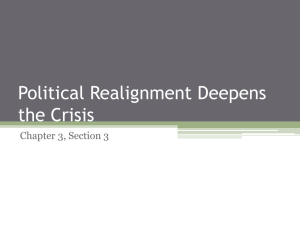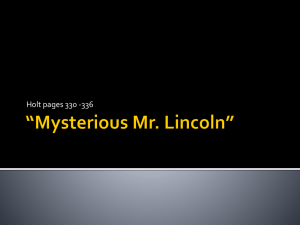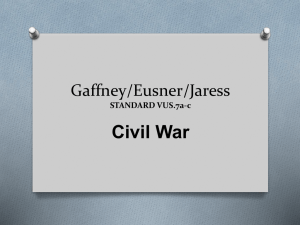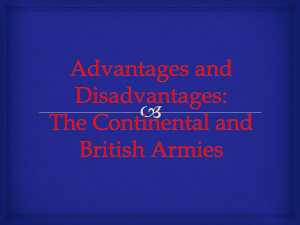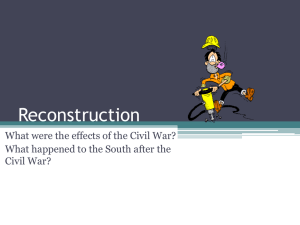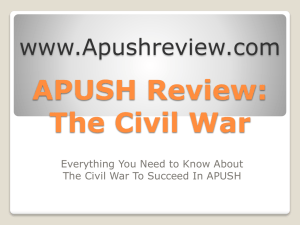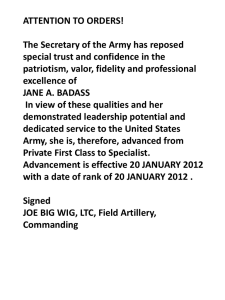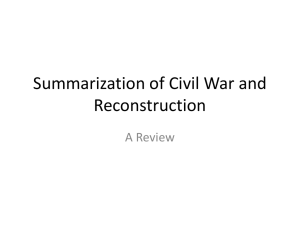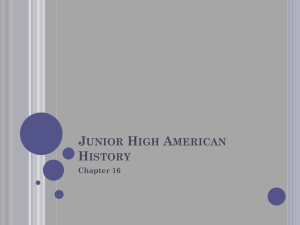Final Exam 2008 Review - East Richland Christian Schools
advertisement
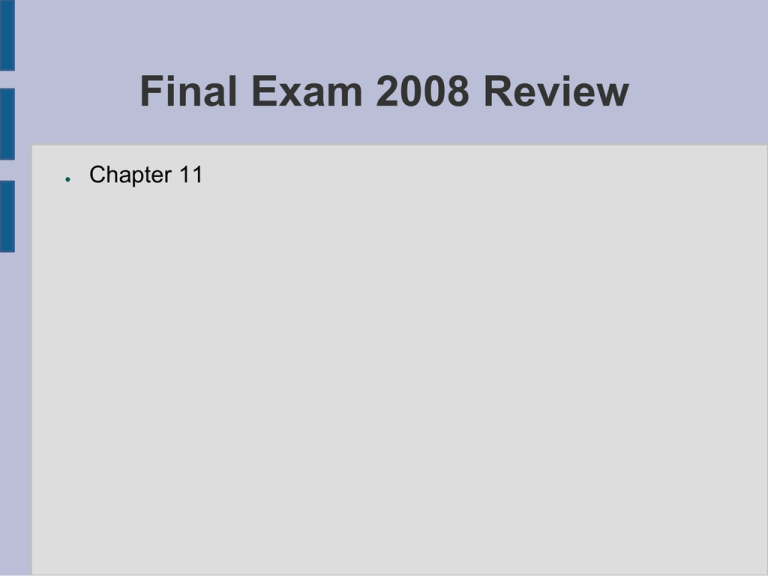
Final Exam 2008 Review ● Chapter 11 ● What was America's first major industry? ● Iron ● coal ● textiles ● railroads ● textiles ● What was the main reason the South fell behind the North in developing industry? ● High tariffs ● lack of resources ● reliance on cotton exports for income ● lack of need for manufactured goods. ● reliance on cotton exports for income ● Why were roads so common in early America when travel by boat was much cheaper? ● Travel by roads was faster than travel by ship ● travel by roads was safer than travel by ship ● roads were the only way to reach landlocked areas ● Americans had too few merchant ships ● roads were the only way to reach landlocked areas ● What was the revival that affected the entire nation in the early eighteenth century? ● Cane Ridge revival ● Prayer Meeting Revival ● Second Great Awakening ● Yale revival ● Second Great Awakening ● What religion was popular among prominent Patriots, such as Thomas Paine? ● Deism ● Methodism ● transcendentalism ● Unitarianism ● Deism ● What young sect became America's largest denomination by 1840? ● Baptists ● Congregationalists ● Methodists ● Presbyterians ● Methodists ● Which group was persecuted because the men took more than one wife? ● Millerites ● Mormons ● Shakers ● transcendentalists ● Mormons ● What was the first revival to be led primarily by laymen? ● Cane Ridge revival ● Prayer Meeting Revival ● First Great Awakening ● Second Great Awakening ● Prayer Meeting Revival ● What new production method did Eli Whitney use to make standardized rifles? ● Interchangeable Parts ● What will the government grant an inventor to protect his rights to an invention? ● patent ● Steel plow ● John Deere ● Robert Fulton ● Cyrus McCormick ● Samuel F. B. Morse ● Eli Whitney ● John Deere ● Reaping machine ● John Deere ● Robert Fulton ● Cyrus McCormick ● Samuel F. B. Morse ● Eli Whitney ● Cyrus McCormick ● Cotton gin – John Deere – Robert Fulton Cyrus McCormick Samuel F. B. Morse Eli Whitney – – – ● Eli Whitney ● Stemboat ● John Deere ● Robert Fulton ● Cyrus McCormick ● Samuel F. B. Morse ● Eli Whitney ● Robert Fulton ● Telegraph – John Deere – Robert Fulton Cyrus McCormick Samuel F. B. Morse Eli Whitney – – – ● Samuel F. B. Morse ● T/F Although the cotton gin greatly reduced the number of slaves necessary to clean cotton, it actually increased the demand for slaves. ● True ● New York's Erie Canal proved to be a great investment ● True ● Founder of the Methodists ● Charles Finney ● John Wesley ● Frederick Douglass ● Joseph Smith ● Harriet Tubman ● Francis Asbury ● John Wesley ● Eloquent former slave ● Charles Finney ● John Wesley ● Frederick Douglass ● Joseph Smith ● Harriet Tubman ● Francis Asbury ● Frederick Douglass ● “father of American Methodism” ● Charles Finney ● John Wesley ● Frederick Douglass ● Joseph Smith ● Harriet Tubman ● Francis Asbury ● Francis Asbury ● Founder of modern revival methods ● Charles Finney ● John Wesley ● Frederick Douglass ● Joseph Smith ● Harriet Tubman ● Francis Asbury ● Charles Finney ● Former slave who made trips to the South to free slaves ● Charles Finney ● John Wesley ● Frederick Douglass ● Joseph Smith ● Harriet Tubman ● Francis Asbury ● Harriet Tubman ● Chapter 12 ● America's “manifest destiny” was to ● “become the greatest nation on earth.” ● “spread liberty and federated self-government to all the nations.” ● “overspread and to possess the whole of the continent.” ● “protect the western hemisphere from European dictators.” ● “overspread and to possess the whole of the continent.” ● What was the greatest spur to American settlement of the Oregon territory? ● Beaver trapping ● gold mining ● missionaries ● hunting ● missionaries ● Why did the Texas settlers decide to fight for independence? ● The Texans disliked the Mexican constitution of 1824 ● the Texans believed in Manifest Destiny ● A Mexican army invaded Texas ● The Mexican government was unstable ● A Mexican army invaded Texas ● The ____________ Trail was the most important trail in the settlement of the far West. ● Mormon ● Oregon ● Sante Fe ● Western ● Oregon ● John Tyler was called “His Accidency” because he ● was never elected president. ● Constantly gave in to the demands of Congress. ● Was voted out of his party. ● Annexed Texas without a formal treaty. ● was never elected president. ● Why was Texas annexed by a joint resolution of Congress rather than a formal treaty? ● The president opposed the annexation. ● Congress lacked the necessary two-thirds support required for a treaty. ● a joint resolution had more authority than a treaty. ● The Constitution required a joint resolution in this case. ● Congress lacked the necessary two-thirds support required for a treaty. ● All of the following contributed to the Mexican War except ● America's refusal to negotiate over purchasing California. ● Mexico's resentment over America's annexation of Texas. ● America's belief in Manifest Destiny. ● The long history of hostility between the two countries. ● America's refusal to negotiate over purchasing California. ● What dispute was the immediate cause of the Mexican War? ● Annexation of Texas ● Texas-Mexico border ● purchase of California ● cession of New Mexico ● Texas-Mexico border ● What military “campaign” required hard marching but little fighting? ● New Mexico ● California ● northern Mexico ● central Mexico ● New Mexico ● Which campaign was won by an American army of explorers, marines, and cavalry? ● New Mexico ● California ● northern Mexico ● central Mexico ● California ● Which state was the “Bear Flag Republic?” ● California ● New Mexico ● Oregon ● Texas ● California ● Which of the following events came last? ● Treaty of Guadalupe Hidalgo ● Annexation of Texas ● Maine boundary settlement ● Gadsden Purchase ● Gadsden Purchase ● What mission became the rallying cry during the Texas' war for independence? _________ ● Alamo ● What do we call a candidate who is largely unknown by the general public? ● Dark horse ● Brought American settlers to Texas ● Stephen Austin ● Webster-Ashburton Treaty ● Alamo ● Sam Houston ● Antonio Lopez de Santa Anna ● John Tyler ● Stephen Austin ● Fought Texans and Americans ● Stephen Austin ● Webster-Ashburton Treaty ● Alamo ● Sam Houston ● Antonio Lopez de Santa Anna ● John Tyler ● Santa Anna ● Settlement of the Maine boundary dispute ● Stephen Austin ● Webster-Ashburton Treaty ● Alamo ● Sam Houston ● Antonio Lopez de Santa Anna ● John Tyler ● Webster-Ashburton Treaty ● Won Texan Intependence ● Stephen Austin ● Webster-Ashburton Treaty ● Alamo ● Sam Houston ● Antonio Lopez de Santa Anna ● John Tyler ● Sam Houston ● Slaughter of a small Texas outpost by the Mesican army ● Stephen Austin ● Webster-Ashburton Treaty ● Alamo ● Sam Houston ● Antonio Lopez de Santa Anna ● John Tyler ● Alamo “His Accidency” ● ● Stephen Austin ● Webster-Ashburton Treaty Alamo Sam Houston Antonio Lopez de Santa Anna John Tyler ● ● ● ● ● John Tyler ● The Whitmans opposed the coming of American settlers to Oregon. ● False ● Texas defeated Santa Anna and won its independence with an army of only 800 men. ● True ● The Oregon Trail made travel safe and comfortable ● False ● The US paid Mexico millions of dollars for land won during the Mexican War. ● True Chapter 13 ● What was the greatest spur to American settlement of California? ● Beaver trapping ● gold rush ● missionaries ● cheap land ● missionaries ● The South resisted the admission of California as a state because they ● ● ● ● believed that new states did not have the right to ban slavery feared the loss of power in the Senate demanded that California become a territory first wanted to introduce slavery into California ● feared the loss of power in the Senate ● What was not a provision of the Compromise of 1850? ● ● ● ● admission of California as a free state abolition of the slave trade in the District of Columbia organization of the New Mexico territory without reference to slavery passage of the transcontinental railroad through Illinois ● passage of the transcontinental railroad through Illinois ● What was probably the most effective propaganda tool for abolition? ● Fugitive Slave Law ● Uncle Tom's Cabin ● Dred Scott decision ● Calhoun Resolutions ● Uncle Tom's Cabin ● The Kansas-Nebraska Act was introduced to ● ● ● ● settle the slavery issue in the territories strengthen the provisions of the Missouri Compromise insure that the transcontinental railroad would benefit Illinois satisfy the demands of abolitionists in the North ● insure that the transcontinental railroad would benefit Illinois ● What party became the real successor to the Whig party? ● Know-Nothing party ● Republican Party ● Free Soil party ● Constitutional Union Party ● Republican Party ● According to Lincoln, what was at the heart of his debate with Douglas? ● The rights of states ● the immorality of slavery ● the social and political equality of blacks ● the need to preserve the Union ● the immorality of slavery ● What event caused the lower South to secede? ● The election of Lincoln ● the raid on Harpers Ferry ● Lincoln's call for troops ● the bombardment of Fort Sumter ● The election of Lincoln ● What event caused the upper South to secede? ● The election of Lincoln ● the raid on Harpers Ferry ● Lincoln's call for troops ● the bombardment of Fort Sumter ● Lincoln's call for troops ● What federal arsenal was attacked in 1859 in hopes of sparking a slave revolt __________________________ ● Harper's Ferry ● Where was the first shot fired in the Civil War? ● Fort Sumter ● Illinois Senator who scrapped the Missouri Compromise ● John Brown ● James Buchanan ● secession ● Dred Scott ● Jefferson Davis ● Stephen A. Douglas ● John C. Fremont ● Abraham Lincoln ● Doublas ● War hero and the first Republican candidate for President ● John Brown ● James Buchanan ● secession ● Dred Scott ● Jefferson Davis ● Stephen A. Douglas ● John C. Fremont ● Abraham Lincoln ● Fremont ● Last Democratic, procompromise president (1857-61) before the Civil War ● John Brown ● James Buchanan ● secession ● Dred Scott ● Jefferson Davis ● Stephen A. Douglas ● John C. Fremont ● Abraham Lincoln ● Buchanan ● Leaving the Union ● John Brown ● James Buchanan ● secession ● Dred Scott ● Jefferson Davis ● Stephen A. Douglas ● John C. Fremont ● Abraham Lincoln ● secession ● Fanatical antislavery terrorist ● John Brown ● James Buchanan ● secession ● Dred Scott ● Jefferson Davis ● Stephen A. Douglas ● John C. Fremont ● Abraham Lincoln ● John Brown ● First Republican president ● John Brown ● James Buchanan ● secession ● Dred Scott ● Jefferson Davis ● Stephen A. Douglas ● John C. Fremont ● Abraham Lincoln ● Lincoln ● President of the confederate States of America ● John Brown ● James Buchanan ● secession ● Dred Scott ● Jefferson Davis ● Stephen A. Douglas ● John C. Fremont ● Abraham Lincoln ● Davis ● Former slave who was denied any rights as a citizen ● John Brown ● James Buchanan ● secession ● Dred Scott ● Jefferson Davis ● Stephen A. Douglas ● John C. Fremont ● Abraham Lincoln ● Dred Scott T/F ● Thousands of slaves were returned to their owners under the Fugitive Slave Law ● False ● by 1860 nearly half of all white Southerners owned slaves ● False ● Chief Justice Taney claimed the Constitution recognized free blacks as citizens ● False ● Buchanan tried to start a war with the Mormon settlers in Utah ● True ● Abraham Lincoln believed Congress should abolish slavery in the South ● False Chapter 14 ● According to the textbook, what was the central issue that sparked the Civil War? ● States' rights ● patriotism ● tariff ● slavery ● States' rights ● What was one of the South's primary advantages at the outset of the Civil War? ● Greater population ● greater productivity ● better commanders ● more railroads ● better commanders ● What was the South's basic strategy for victory during the Civil War? ● To capture Washington, D.C. ● To outlast the North's will to fight ● to keep Britain out of the war ● to destroy the North's manufacturing capabilities ● To outlast the North's will to fight ● Where did most of the fighting occur in the East? – Maryland – North Carolina – Pennsylvania – Virginia ● Virginia ● What event made the North realize that the Civil War would not be quickly over? – First Battle of Manassas – Trent affair – Siege of Petersburg – The Monitor and Merrimac clash ● First Battle of Manassas ● The significance of the clash between the Monitor and the Merrimac was that the – Confederates broke the Union blockade – Confederates sank two Union ships – Union completed its blockade – Age of wooden ships began to come to a close ● Age of wooden ships began to come to a close ● A border state was a ● state that entered the Union after the Civil War began ● state on the edge of the frontier ● slave state that did not secede ● slave state that barely passed an ordinance of secession ● slave state that did not secede ● What were Copperheads? ● Southern sympathizers in the North ● anti-war party in the election of 1864 ● immigrants ● Rebel soldiers ● Southern sympathizers in the North ● The capture of what city insured Lincoln's reelection in 1864? ● Atlanta ● New Orleans ● Petersburg ● Vicksburg ● Atlanta ● What famous speech did Lincoln give to dedicate a war cemetery for one of the bloodiest battles of the Civil War? ● Gettysburg Address ● What state was unconstitutionally admitted into the Union during the Civil War? ● West Virginia ● Pickett's Charge was a last-ditch effort by Confederates to win at Gettysburg. ● True ● During the war, Lincoln sometimes acted beyond his constitutional powers. ● True ● Sherman estimated that his army destroyed less than one million dollars worth of Southern property during the march on Savannah. ● False ● The Civil War was the bloodiest war in American history. ● True ● The South suffered more casualties than the North during the Civil War. ● False ● Effort to blockade the South and capture the Mississippi River ● Anaconda Plan ● Siege of Vicksburg ● Appomattox Court House ● Army of Northern Virginia ● Battle of Gettysburg ● Army of the Potomac ● Anaconda Plan ● The North's main army in the East ● Anaconda Plan ● Siege of Vicksburg ● Appomattox Court House ● Army of Northern Virginia ● Battle of Gettysburg ● Army of the Potomac ● Army of the Potomac ● The South's main army in the East ● Army of Northern Virginia ● End of the South's offensive capabilities ● Anaconda Plan ● Siege of Vicksburg ● Appomattox Court House ● Army of Northern Virginia ● Battle of Gettysburg ● Army of the Potomac ● Gettysburg ● Loss of “the nailhead” that held the South together ● Anaconda Plan ● Siege of Vicksburg ● Appomattox Court House ● Army of Northern Virginia ● Battle of Gettysburg ● Army of the Potomac ● Vicksburg ● Surrender of the Army of Northern Virginia ● Anaconda Plan ● Siege of Vicksburg ● Appomattox Court House ● Army of Northern Virginia ● Battle of Gettysburg ● Army of the Potomac ● Appomattox Chapter 15 ● For what reason was Andrew Johnson impeached? – His personal secretary was indicted for fraud – He was involved in the Credit Mobilier Scandal – He vetoed the Military Reconstruction Act – He dismissed a Radical secretary of war ● He dismissed a Radical secretary of war ● What was NOT one of the provisions of the Military Reconstruction Act? – The South was divided into five military districts – Congress selected a military governor for each district – Each state had to pass the 14th Amendment – Each state had to write a new constitution granting universal male suffrage regardless of race ● Congress selected a military governor for each district ● Which of the following was NOT one of the positive contributions of Radical governments in the South? – Public school systems – Universal manhood suffrage – Disenfranchisement of Southern whites – Rebuilding of transportation systems ● Disenfranchisement of Southern whites ● Why did sharecropping become common in the South during Reconstruction? – The Radicals imposed sharecropping on the South – Southerners wanted to restore a plantation economy – The South lacked sufficient money to pay wages – The South wanted the freed slaves to buy their own land ● The South lacked sufficient money to pay wages ● In what scandal did Fisk and Gould participate? – Manipulating the price of gold – Defrauding the government on railroad expenses – Diverting funds from New York City government – Cheating the government of excise taxes ● Manipulating the price of gold ● Why was Tammany Hall allowed to continue its corruption? – Grant was bribed – Most politicians were unaware of its scandals – Democratic leaders needed its help for votes – Tammany Hall paid its debts ● Democratic leaders needed its help for votes ● What did the Republicans offer Southern Democrats in return for their support in electing Rutherford B. Hayes? – Removal of federal troops from the South – Return of Black Codes – Recognition of the Ku Klux Klan – Financial aid to the South ● Removal of federal troops from the South ● What term refers to the National government's attempt to rebuild the South following the Civil War? ● Reconstruction ● Indictment of a political official by Congress ● carpetbagger ● disenfranchisement ● greenbacks ● impeachment ● Scalawag ● sharecropping ● impeachment ● Northern Radical who moved South ● carpetbagger ● disenfranchisement ● greenbacks ● impeachment ● Scalawag ● sharecropping ● Carpetbagger ● Southern Radical ● carpetbagger ● disenfranchisement ● greenbacks ● impeachment ● Scalawag ● sharecropping ● Scalawag ● Denial of the right to vote ● carpetbagger ● disenfranchisement ● greenbacks ● impeachment ● Scalawag ● sharecropping ● disenfranchisement ● Method for freed slaves to farm the land without cash ● carpetbagger ● disenfranchisement ● greenbacks ● impeachment ● Scalawag ● sharecropping ● sharecropping ● Paper money not backed by gold or silver ● carpetbagger ● disenfranchisement ● greenbacks ● impeachment ● Scalawag ● sharecropping ● greenback Chapter 16 ● What was NOT a major cause of American industrial growth during the Gilded Age? – Immigration – Innovative spirit – Low tariff – New sources of power ● Low tariff ● What was the first major trust that became the inspiration for many others? – American Tobacco Company – Standard Oil Company – United States Steel Corporation – American Telephone & Telegraph ● Standard Oil Company ● The twin pillars of the “New South” were tobacco and – Textiles – Cotton – Shipping – oil ● textiles ● What Christian industrial leader lived by the motto “To do a common thing uncommonly well brings success”? – Andrew Carnegie – H. J. Heinz – John D. Rockefeller – Cornelius Vanderbilt ● H. J. Heinz ● What was the most significant communications achievement during the Gilded Age? – Telegraph – Typewriter – Telephone – automobile ● telephone ● Politics during the gilded Age was dominated by all of the following issues EXCEPT – Civil service reform – Tariff revision – Regulation of trusts – Aid to the poor ● Aid to the poor ● What industry was the main cause for passage of the Interstate Commerce Act? – Oil – Railroads – Telegraph – Telephone ● Railroads ● What was the most significant goals of the Grange during the 1870's – Social contacts for farmers – Scientific research in farming – State regulations of railroads – Free silver ● State regulation of railroads ● What philosophy was used to defend the development of monopolies in industries such as oil and steel? – Naturalism – Reform Darwinism – Social Darwinism – socialism ● Social Darwinism ● What was NOT a major element of American society during the Gilded Age? – Urbanization – New Immigration – Materialism – romanticism ● romanticism ● Which of the following is NOT one of the human explanations for Moody's success? – Education – Plain speaking – Simple theme of salvation – Careful organization ● education Chapter 17 test review The first transcontinental railroad was built primarily with immigrants from China and Ireland Germany Italy Japan Ireland What is the significance of Promontory Point, Utah? It was the center of a gold rush. It was the site of an Indian massacre. It was the end of the cattle drive. It was the junction of the transcontinental railroad. It was the junction of the transcontinental railroad. What territory was settled by “land rushes”? Alaska Hawaii Oklahoma Utah Oklahoma What became of the main crop of the Great Plains? Corn Cotton Soybeans Wheat Wheat What was the key to the culture of the Plains Indians? Buffalo Deer Mustangs Rifles Buffalo What was the American government's official goal during the Indian Wars? The government wanted to exterminate the Indians The government planned to send the Indians to Canada The government intended to move the Indians to reservations The government wished to coexist peacefully with the Indians The government intended to move the Indians to reservations What territory did America purchase from Russia in 1867? Alaska Guam Hawaii The Philippines Alaska How did the United States acquire Hawaii Annexation Conquest Purchase Treaty of alliance Annexation Who were the Rough Riders? Cowboys who used the Chisholm Trail Ranchers who fought in the “range wars” Yellow journalists who encouraged war with Spain A volunteer unit during the Spanish-American War A volunteer unit during the Spanish-American War As a result of the Spanish-American War, the U.S. Gained ownership of all the following territories except Cuba Guam The Philippines Puerto Rico Cuba What invention enabled farmers to fence their land on the treeless plains? Barbed wire What are tracts of land set aside for Indians? reservations What term describes the extension of power by one people or country over another country or region? Imperialism What type of sensationalized news reporting became popular in the United States late in the century? Yellow journalism What war did America fight over the independence of Cuba? Spanish-American war T/F The railroad corporations that built the transcontinental railroads received about 20 million acres of land grants as a reward from the federal government. True T/F The American government tended to place Indians on arid, barren reservations that were useless to the whites. True Provided 160 acres in the West free to anyone who improved it ● Boxer Rebellion ● Homestead Act ● Open Door Policy ● Pan-Americanism ● Wounded Knee Massacre Homestead act A bloody attack on a surrendered Indian band ● Boxer Rebellion ● Homestead Act ● Open Door Policy ● Pan-Americanism ● Wounded Knee Massacre Wounded Knee Massacre Movement toward greater unity among nations in the Western Hemisphere Boxer Rebellion Homestead Act Open Door Policy Pan-Americanism Wounded Knee Massacre Pan-Americanism Antiforeign movement in China ● Boxer Rebellion ● Homestead Act ● Open Door Policy ● Pan-Americanism ● Wounded Knee Massacre Boxer rebellion Chapter 18 ● What theme did Theodore Roosevelt adopt during his first campaign? – New Deal – New Freedom – New Nationalism – Square Deal ● Square Deal ● What was the subject of The Jungle? – Conservation – Jim Crow laws – Meat packing – Poor housing ● Meat Packing ● What was MOST significant about the miner's strike of 1902? – The public sympathized with the miners – The federal government acted as a mediator – Coal was the major source of heat for the nation – The owners consented to a nine-hour workday ● The federal government acted as a mediator ● Theodore Roosevelt crusaded for all of the following causes EXCEPT – Conservation – Segregation – Trust-busting – The Panama Canal ● segregation ● American leaders were afraid to grant the Philippines independence too quickly because they – Wanted the Philippines to pay for the damages caused by their insurrection – Wanted to keep the Philippine markets open for trade – Feared that another country would take over the Philippines – Believed the Filipinos would be incapable of ● Feared that another country would take over the Philippines ● What phrase is most closely associated with the Roosevelt Corollary? – Big stick – International policeman – Great White Fleet – Square Deal ● Big stick. ● What action resulted in a final split between Taft and Roosevelt? – Firing of the head of the U.S. Forest Service – Tariff reform fiasco – Dollar diplomacy – Antitrust suit against U.S. Steel ● Antitrust suit against U.S. Steel ● Why did Congress pass its first income tax in 1913? – Loss of tariff revenues – Rise of the Socialist party – Existence of a huge national debt – Creation of the Federal Reserve – Loss of tariff revenues ● What was the most significant agricultural advance during the Progressive Era? – Combine – Harvester – Tractor – Barbed wire ● Tractor ● Progressive education emphasized – Memorization – History – Experience – Latin ● Experience ● Which of the following progressive assumptions is CORRECT. – Man has a duty to help the poor – Man is basically good – Progress is inevitable – The reform of man's environment can solve his problems ● Man has a duty to help the poor ● What is a popular term for breaking up monopolies? ● trust-busting ● What term refers to progressive writers who expose abuse and corruption? ● muckrakers ● What is the name of laws in the South that segregated the races? ● Jim-Crow laws ● Who perfected the assembly line method of production? ● Henry Ford ● Crusader for women's suffrage ● Susan B. Anthony ● John Dewey ● W.E.B. DuBois ● Billy Sunday ● Booker T. Washington ● Anthony ● Conservative black; Up from Slavery ● Susan B. Anthony ● John Dewey ● W.E.B. DuBois ● Billy Sunday ● Booker T. Washington ● Washington ● Black cofounder of NAACP ● Susan B. Anthony ● John Dewey ● W.E.B. DuBois ● Billy Sunday ● Booker T. Washington ● DuBois ● Advocate of progressive education ● Susan B. Anthony ● John Dewey ● W.E.B. DuBois ● Billy Sunday ● Booker T. Washington ● Dewey ● Urban evangelist ● Susan B. Anthony ● John Dewey ● W.E.B. DuBois ● Billy Sunday ● Booker T. Washington ● Sunday True/False ● “Gas and water socialism” favored government ownership of nearly all business. ● False ● Women's suffrage was an issue long before the progressives began to crusade for it. ● True ● The Pure Food and Drug Act proved to be a wasteful, ineffective form of government intervention. ● False ● The first income tax was an unfair burden to the poor. ● False ● The era from 1898 to 1914 was a boom for American agriculture. ● True ● The progressive movement opposed the growth of federal government ● False
